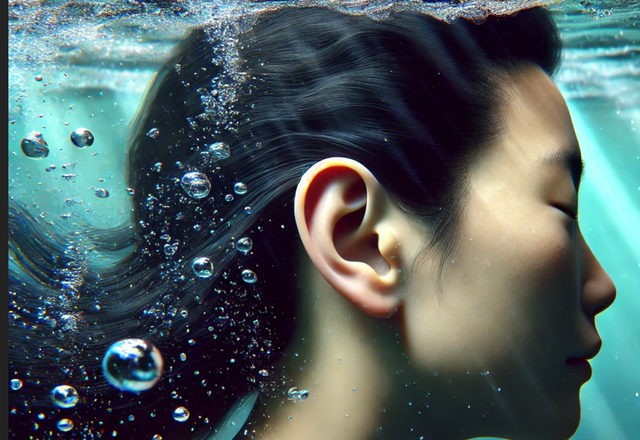Incorrect swimming habits can cause perforated eardrums.
Master - Doctor Tran Thi Tuyet Suong, Deputy Head of the Interdisciplinary Department, Xuyen A General Hospital, Ho Chi Minh City, said that perforated eardrums when swimming often come from seemingly harmless habits.
Dangerous swimming habits that can lead to a perforated eardrum include:
First, jumping from a height into water without ear protection. When the body hits the water at high speed, the sudden water pressure can damage the eardrum, especially if the jump is performed with incorrect posture.
Second, deep diving does not know how to equalize ear pressure. When diving at depth, the water pressure can vary significantly between the outer ear and the middle ear. If the pressure is not equalized, the eardrum can be overstretched and lead to tearing or perforation.

People go swimming at a swimming pool in Thu Duc City
PHOTO: LE CAM
Third, do not use ear protection when swimming or use it incorrectly. Many people do not wear earplugs or swimming caps to cover their ears, allowing water to easily enter the ear canal, easily causing otitis externa, which can affect the eardrum if not treated promptly. In addition, inserting too shallowly or inserting too deeply also causes many side effects that affect the ears.
Fourth, improper ear cleaning after swimming. Using cotton swabs or sharp objects to clean your ears after swimming can push water deeper into your ears or directly damage your eardrum.
Finally, swimming while you have ear problems such as otitis externa or otitis media increases the risk of infection and damage to the eardrum.
How dangerous is a perforated eardrum?
A perforated eardrum is not only a temporary pain, but can also have serious consequences. A perforated eardrum can cause permanent hearing loss if not treated promptly and properly.
In addition, when the eardrum is perforated, bacteria from the outside environment can easily enter the middle ear, causing serious infections. Especially in children, otitis media due to a perforated eardrum can affect language development and learning ability.
Many patients with perforated eardrums also face dizziness, balance disorders and persistent tinnitus, which seriously affects their quality of life.
Recommendations for ear protection when swimming
To prevent perforated eardrums when swimming, Dr. Suong recommends:
Use earplugs correctly : Earplugs designed for swimmers are the most effective way to prevent water from entering the ears. Choose the right size for your ear canal and make sure you wear it correctly. Cheap, poor quality earplugs may not be waterproof.
Wear a swim cap that covers your ears : A swim cap not only reduces friction while swimming, but also protects your ears from water. Choose a swim cap that covers your ears and make sure it fits properly.

You should use protective equipment such as ear covers when swimming, and clean your ears properly after swimming...
ILLUSTRATION: AI
Avoid jumping from heights into water : If you cannot avoid it, learn to protect your ears by keeping your head tilted slightly and covering your ears with one hand when in contact with the water surface.
Learn pressure equalization techniques : The Valsalva technique (closing your mouth, pinching your nose, and blowing gently) helps equalize the pressure between the outer and middle ears when diving to depths.
Dry your ears properly after swimming : After swimming, tilt your head to the sides to let the water drain out. You can use a hair dryer on the cool setting, about 30cm away from your ear to dry the outer ear.
Avoid cleaning your ears with cotton swabs : Do not use cotton swabs or anything else to clean your ears after swimming. If you feel that water is still in your ears, you can use a specialized ear drying solution as directed by your doctor.
Don't swim if you have ear problems : If you have an ear infection, cold or other upper respiratory problem, avoid swimming until you are completely recovered.
Check the quality of swimming water : Swim in a pool with a standard water filtration and treatment system to minimize the risk of infection if water accidentally gets into the ear.
When to see a doctor?
"People should go to a medical facility immediately after swimming if they experience symptoms such as sudden or severe ear pain, a feeling of fluid draining from the ear, sudden hearing loss, dizziness or loss of balance, or persistent tinnitus... If a perforated eardrum is detected and treated early, the recovery rate is high. However, if left untreated, the damage can become permanent," Dr. Suong advised.
Source: https://thanhnien.vn/di-boi-ngay-nong-can-chu-y-gi-de-tranh-thung-mang-nhi-185250520233711455.htm

































































































Comment (0)